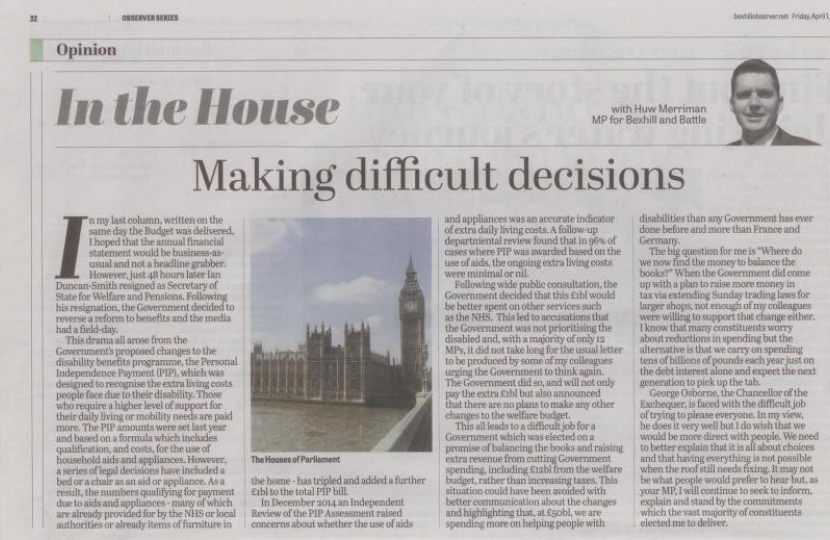
In my last column, written on the same day the Budget was delivered, I hoped that the annual financial statement would be business-as-usual and not a headline grabber. However, just 48 hours later Ian Duncan-Smith resigned as Secretary of State for Welfare and Pensions. Following his resignation, the Government decided to reverse a reform to benefits and the media had a field-day.
This drama all arose from the Government's proposed changes to the disability benefits programme, the Personal Independence Payment (PIP), which was designed to recognise the extra living costs people face due to their disability. Those who require a higher level of support for their daily living or mobility needs are paid more. The PIP amounts were set last year and based on a formula which includes qualification, and costs, for the use of household aids and appliances. However, a series of legal decisions have included a bed or a chair as an aid or appliance. As a result, the numbers qualifying for payment due to aids and appliances - many of which are already provided for by the NHS or local authorities or already items of furniture in the home - has tripled and added a further £1bl to the total PIP bill.
In December 2014 an Independent Review of the PIP Assessment raised concerns about whether the use of aids and appliances was an accurate indicator of extra daily living costs. A follow-up departmental review found that in 96% of cases where PIP was awarded based on the use of aids, the ongoing extra living costs were minimal or nil.
Following wide public consultation, the Government decided that this £1bl would be better spent on other services such as the NHS. This led to accusations that the Government was not prioritising the disabled and, with a majority of only 12 MPs, it did not take long for the usual letter to be produced by some of my colleagues urging the Government to think again. The Government did so, and will not only pay the extra £1bl but also announced that there are no plans to make any other changes to the welfare budget.
This all leads to a difficult job for a Government which was elected on a promise of balancing the books and raising extra revenue from cutting Government spending, including £12bl from the welfare budget, rather than increasing taxes. This situation could have been avoided with better communication about the changes and highlighting that, at £50bl, we are spending more on helping people with disabilities than any Government has ever done before and more than France and Germany.
The big question for me is “Where do we now find the money to balance the books?” When the Government did come up with a plan to raise more money in tax via extending Sunday trading laws for larger shops, not enough of my colleagues were willing to support that change either. I know that many constituents worry about reductions in spending but the alternative is that we carry on spending tens of billions of pounds each year just on the debt interest alone and expect the next generation to pick up the tab.
George Osborne, the Chancellor of the Exchequer, is faced with the difficult job of trying to please everyone. In my view, he does it very well but I do wish that we would be more direct with people. We need to better explain that it is all about choices and that having everything is not possible when the roof still needs fixing. It may not be what people would prefer to hear but, as your MP, I will continue to seek to inform, explain and stand by the commitments which the vast majority of constituents elected me to deliver.


